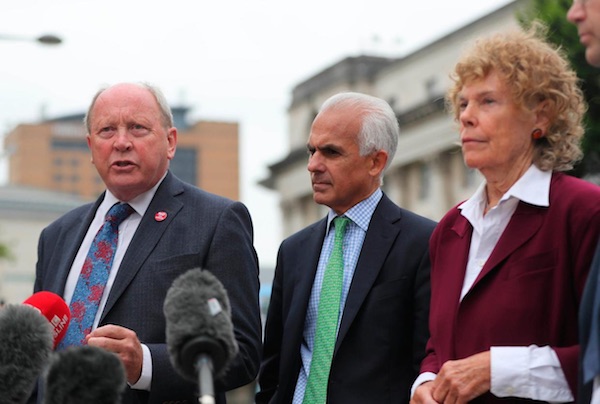
Unionists have been outraged by a Belfast High Court ruling that Brexit implicitly repeals part of the Acts of Union, which legislated for the annexation of Ireland by Britain in 1800 following the defeat of the United Irishmen rebellion two years earlier.
A legal challenge to the Irish protocol of Brexit had been brought in Belfast in the name of a number of prominent unionists, including former DUP leader Arlene Foster, former UUP leaderSteve Aiken, TUV leader Jim Allister, former UUP leader David Trimble, former MP Kate Hoeyand former Brexit Party MEP Ben Habib.
However, the ruling was a major setback for their legal challenge. The judge, Justice Colton, rejected all the grounds of the case, repeatedly pointing out that under British constitutional law, the Westminster parliament is sovereign.
He rejected claims that the Protocol breaches either the Acts of Union 1800 or the 1998 Good Friday Agreement. He declared: “The making of treaties and the conduct of foreign affairs are matters of high level politics which are entirely unsuited to supervision by a court on a judicial review application.”
Part of the case centred on the concept of implied repeal, where a later Act is assumed to take precedence over earlier conflicting legislation.
Delivering judgment, Justice Colton held that the 2018 Brexit Withdrawal Act overrides Article 6 of the Acts of Union, which inscribed the first formal customs union between the two islands.
“The more general words of the Act of Union 1800 written 200 plus years ago in an entirely different economic and political era could not override the clear specific will of Parliament, as expressed through the Withdrawal Agreement and Protocol, in the context of the modern constitutional arrangements for Northern Ireland,” he said.
“This matter must also be considered in light of the fact that every provision and clause of the Withdrawal Acts, the Protocol and associated documents were fully considered by Parliament.”
While the occupation of the north of Ireland has always been maintained by force, under British law the Act of Union was the legislative basis for London’s jurisdiction in the north of Ireland. It has been heavily amended and supplanted by subsequent legislation, particularly the 1920 Government of Ireland Act which formalised the partition of Ireland, although that was itself repealed by the Good Friday Agreement.
All of the unionists were enraged.
“The judge found against us on every ground but, crucially, what he found was the Act of Union Article 6, a fundamental part of the Act of Union 1800, no longer exists, that Northern Ireland and Great Britain have effectively been severed by the Protocol,” said Ben Habib (pictured, centre).
“It seems to have just gone through Parliament without even the prime minister recognising that his own act, the Northern Ireland Protocol, has actually broken the union of the United Kingdom.
“He denied it in the Commons the other day but actually that’s precisely what this High Court has just ruled, the union of the United Kingdom has been broken.”
‘SAUSAGE CEASEFIRE’
Meanwhile, the European Union has agreed to a three-month delay to a ban on some meat products from Britain being sold in the north of Ireland.
The proposed ban on items like fresh sausages remains the most troublesome real-world consequence of the Protocol, dubbed the ‘sausage war’. The EU and London agreed to extend a so-called grace period - the time before the ban comes into effect.
The new arrangement means the meat ban will be postponed until 30 September.
![[Irish Republican News]](https://republican-news.org/graphics/title_gifs/rn.gif)
![[Irish Republican News]](https://republican-news.org/graphics/title_gifs/harp.gif)

